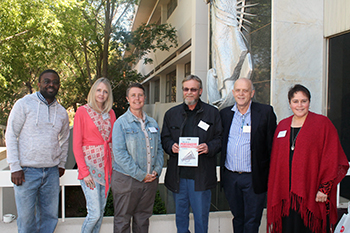Latest News Archive
Please select Category, Year, and then Month to display items
12 January 2024
|
Story Nonsindiswe Qwabe
|
Photo Sonia Small
 Since joining the UFS in 2008, Dr Grey Magaiza has worked extensively on approaches that can foster the socio-economic transformation of societies.
Since joining the UFS in 2008, Dr Grey Magaiza has worked extensively on approaches that can foster the socio-economic transformation of societies.
“The future should be one where communities can decide on their development agenda and futures. That’s the most important for me.” Dr Grey Magaiza, Deputy Director of the Centre for Gender and Africa Studies (CGAS) and Head of the Community Development programme on the Qwaqwa Campus, is passionate about capacitating communities to be agents of change and advancement. His vision for the future emphasises the empowerment of communities to take charge of their development by actively participating in decision making and the implementation of development projects that can improve their lives.
Since joining the UFS in 2008, Dr Magaiza has worked extensively on approaches that can foster the socio-economic transformation of societies. Over the years, he has crafted his research speciality into one that he is most proud of – being an interdisciplinary scientist immersed in the development of communities.
“I’m in a fortunate position of researching what I like. I say ‘fortunate’, because I’ve taken the time to understand what I’m passionate about, which is the overall field of rural livelihoods and livelihood futures – in short, community development. My research starts from an engaged university, understanding the elements that a university must use to enhance transformation and relevance to its immediate community in terms of development.”
One of the ways he has done this is by looking at social entrepreneurship as a development approach for young people in a rural setting. Through workshops with non-profit and civic organisations in Qwaqwa, Dr Magaiza has been helping these organisations to map out their needs and actively meet them through the involvement and support of external role players.
“We understand that communities are part of the national development agenda, but even that national agenda respects community knowledge and intentions and allows communities to shape their identity. A critical enabler of this is community organising. You bring back the capacity in communities to have dialogues on issues affecting them as spaces for engagement, knowledge exchange, and for people to just talk about their way forward.”
By enabling communities to define their development agenda, they can address their specific needs, challenges, and aspirations, he said. “When I look at livelihood futures, it’s quite an exciting aspect of my work – it’s like looking into a fortune tellers’ globe, because you’re not deciding for communities what they should do, but the communities themselves take those decisions.”
International delegates attend SACOMM conference at UFS
2016-10-12

From the left: Prof Colin Chasi, Chairperson of the
South African Communications Association,
Dr Dalme Mulder UFS Lecturer; Dr Wilmien Marais,
UFS Lecturer; Prof Johann de Wet, former head of
UFS Department of Communication Science
Prof Tom O’Regan, University of Queensland (Australia)
and Prof Milli Rivera, Head of the UFS Department of
Communication Science during the conference on the
UFS Bloemfontein Campus.
Photo: Rulanzen Martin
Communication from within and below: Social Transformation and Inclusiveness. That was the theme of the 2016 South African Communication Association (SACOMM) conference, hosted at the Bloemfontein Campus of the University of the Free State (UFS) from 3 to 5 October 2016.
“Through this theme, participants were invited to submit papers that examined the role of communication in today’s tumultuous climate,” said Prof Mili Rivera, Head of the Department of Communication Science at the UFS.
A total of 140 delegates from other South African universities, as well as international delegates from Zimbabwe, Nigeria, the United Kingdom, United States, and Australia attended the conference. It was the second time in ten years that the UFS hosted the conference.
Organisation to mentor and support emerging scholars
Various staff members and students from the UFS Department of Communication Science presented papers during the three days.
Annette van Baalen and Dr Dalme Mulder, both lecturers in the department, won the best paper award in the Corporate Communication division. A number of emerging scholars also presented papers. “The organisation is committed to mentoring and supporting emerging scholars in the field of Communication Science,” said Prof Rivera.
Association must be agent of change in curriculum
Delegates discussed the role of the organisation (SACOMM) as an agent of change in terms of decolonising the curriculum. The focus was on training journalists to cover crises in a fair and balanced manner. The book The Art of Persuasive Communication - A Process (4th Edition) by Prof Johann de Wet, former head of the UFS Department of Communication Science, was also launched during the conference.
The next SACOMM conference will take place at Rhodes University in 2017.